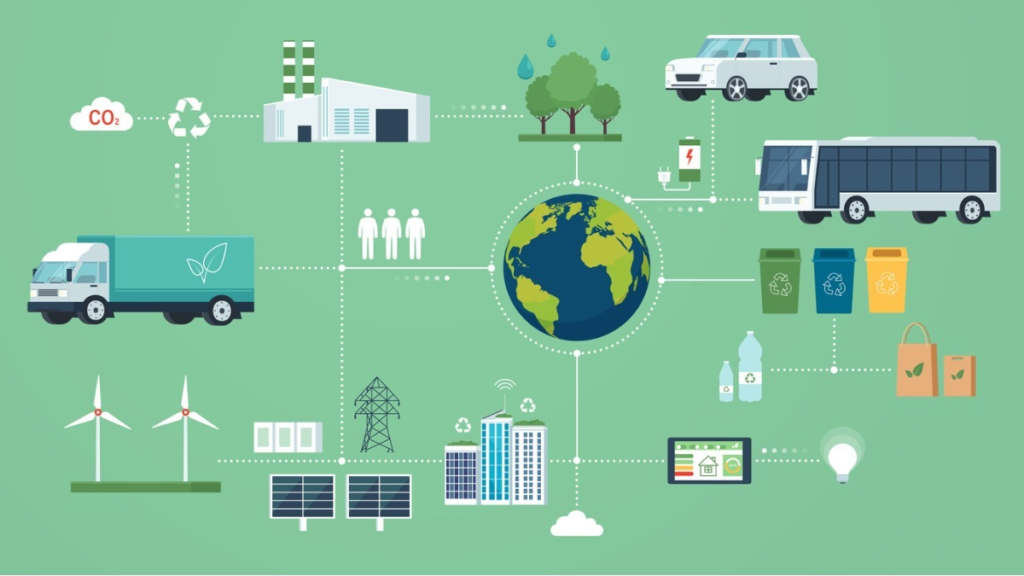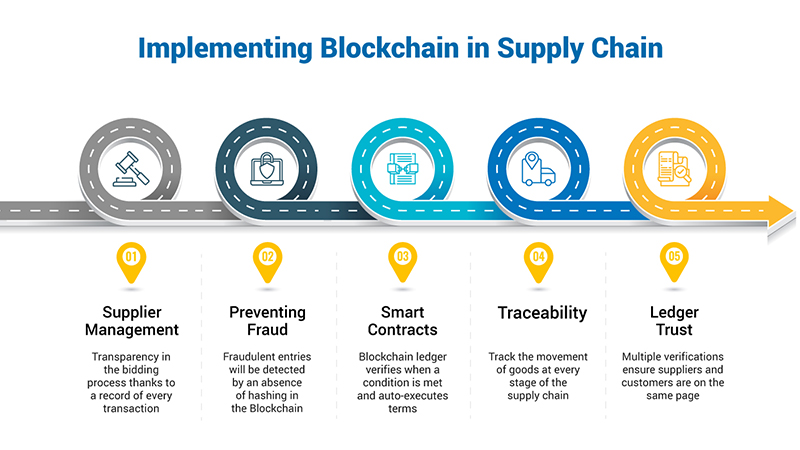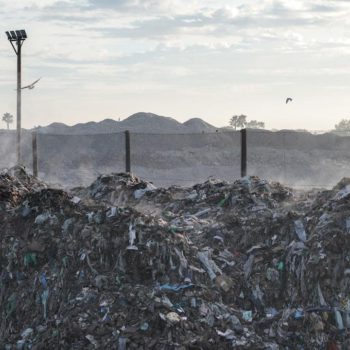|
|
The COVID-19 pandemic and evolving consumer demands have amplified the need for enhanced visibility and traceability within supply chains.
Blockchain technology is currently being explored to authenticate ethical supply chain practices in sustainable sourcing.
Blockchain offers advantages such as fortifying supply chains, increasing transparency, and improving data accuracy. However, challenges such as technological barriers and collaboration among stakeholders need to be addressed.
If you want to learn more about how blockchain improves supply chains, read on.
The Importance of Ethical Supply Chain Practices
Consumers are increasingly concerned about the origins of the products they purchase and the social and environmental impact of their consumption choices.
A good example of a company addressing these concerns is Starbucks. The coffee giant is devoted to ensuring 100% sustainability in its coffee sourcing practices. It has implemented a system known as C.A.F.E (Coffee and Farmer Equity Practices) to enhance its commitment to sustainable sourcing.
This program is centered around four key principles: maintaining quality, ensuring economic transparency, upholding social responsibility, and demonstrating environmental leadership.
The importance of ethical supply chain practices is evident in the growing demand for transparency and accountability in sourcing. It is necessary to address issues such as human rights violations, environmental degradation, and unfair labor practices.
Ethical supply chain practices ensure products are sourced responsibly, with consideration for social and environmental factors. It includes providing fair wages and safe working conditions for workers, minimizing environmental harm through sustainable practices, and respecting human rights throughout the supply chain.
Ethical sourcing also contributes to the long-term viability and reputation of businesses, as consumers are more likely to support companies that align with their values.
Understanding Sustainable Sourcing and Its Impact
Sustainable sourcing refers to the practice of procuring goods and services in a manner that minimizes negative environmental, social, and economic impacts. It involves the consideration of factors such as carbon emissions, water usage, labor conditions, and the overall ecological footprint of the supply chain.
The essence of sustainable sourcing is significantly tied to the concept of the “triple bottom line“, a term coined in 1994 by John Elkington, a renowned British management consultant and sustainability expert.
Elkington proposed that a company’s performance should not only be measured by its profitability, but also by its contributions to people’s lives and the health of our planet.

By adopting sustainable sourcing practices, organizations can contribute to preserving natural resources, supporting local communities, and ensuring the long-term viability of their operations.
Furthermore, sustainable sourcing can enhance brand reputation, attract environmentally conscious consumers, and mitigate regulatory and legal risks.
Businesses, governments, and consumers must recognize the importance of sustainable sourcing and collaborate to create a more sustainable and responsible global supply chain.
Implementing Blockchain Solutions for Ethical Verification

Utilizing blockchain solutions to verify ethical standards in supply chains can significantly increase transparency and accountability within the industry.
The inherent features of blockchain technology, such as its decentralized and immutable nature, can effectively address the challenges of verifying these ethical standards.
How blockchain improves supply chains is geared towards secure recording and sharing of important information. This includes product origins, manufacturing processes, and transportation details.
This augmented transparency allows consumers to make well-informed decisions. These are based on proven ethical standards, such as fair trade practices, acceptable labor conditions, and commitment to environmental sustainability.
In addition, blockchain technology simplifies the tracking and verification of certifications and audits. This makes it easier to ensure that ethical standards are maintained across the entire supply chain.
Overall, integrating blockchain solutions for ethical verification can boost trust, promote ethical sourcing, and contribute to a more sustainable supply chain industry.
Future Implications of Blockchain in Ensuring Ethical Supply Chains
The future implications of incorporating blockchain technology in supply chains can help ensure adherence to ethical standards and promote greater transparency and accountability throughout the industry.
1. Enhanced Traceability
Blockchain can provide a tamper-proof record of every transaction and movement within the supply chain. It allows companies to verify the origin and authenticity of products, ensuring that ethical sourcing practices are followed.
2. Improved Supplier Management
Blockchain can facilitate the creation of decentralized supplier databases, allowing companies to verify the ethical practices of their suppliers. It can help prevent the use of forced labor, child labor, or other unethical practices.
3. Increased Consumer Trust
With blockchain, consumers can access detailed information about the products they purchase, including information about the materials used, manufacturing processes, and ethical certifications. This transparency builds trust and allows consumers to make informed choices.
4. Compliance With Regulations
Blockchain can streamline compliance with regulations related to ethical sourcing, such as the Conflict Minerals Rule. By providing an immutable record of supply chain activities, blockchain can simplify auditing and reporting processes. It makes maintaining compliance with legal requirements much more manageable.
Navigating Challenges in Blockchain Adoption in the Supply Chain
Implementing blockchain in the supply chain is not without its challenges. Let’s explore these challenges below:
- Interoperability: One of the significant challenges of implementing blockchain in the supply chain is ensuring interoperability across different systems and platforms. Supply chains involve multiple stakeholders, each with unique systems and protocols. Achieving seamless integration and data exchange between these diverse systems can be complex and require standardization efforts.
- Scalability: Another challenge is scalability. As the supply chain involves a vast amount of data and transactions, the blockchain network needs to be able to handle large volumes of information efficiently. Scaling blockchain technology to accommodate the demands of a global supply chain can be a technical challenge that requires optimizing processing power and network capacity.
- Security and Privacy: Security and privacy concerns are paramount when using blockchain in the supply chain. While blockchain offers inherent security through its decentralized and immutable nature, ensuring the privacy of sensitive information remains a challenge. Striking the right balance between transparency and confidentiality is crucial to protect sensitive business data and personal information within the supply chain ecosystem.
- Stakeholder Buy-In and Adoption: The success of implementing blockchain in the supply chain relies on the participation and buy-in of all stakeholders involved. Convincing different participants, such as suppliers, manufacturers, logistics providers, and retailers, to adopt blockchain technology can be a challenge.
These challenges highlight the need for collaboration, standardization, and education within the supply chain industry to overcome the barriers to blockchain adoption.
Final Thoughts
In conclusion, blockchain technology presents a promising solution to enhance transparency and ethical practices in supply chains. Promoting sustainable sourcing can create a win-win situation for businesses, governments, consumers, and the environment.
Nonetheless, implementation is not without its challenges. Overcoming obstacles such as interoperability, scalability, security, and privacy concerns will require intense collaboration, standardization efforts, and education among all stakeholders involved in the supply chain process.
As we navigate towards a future dominated by digital transformation, companies may need to invest resources in understanding blockchain and exploring its potential benefits. If properly harnessed, blockchain could revolutionize the way we ensure ethical sourcing and promote sustainability, thereby creating a more responsible and accountable global economy.












